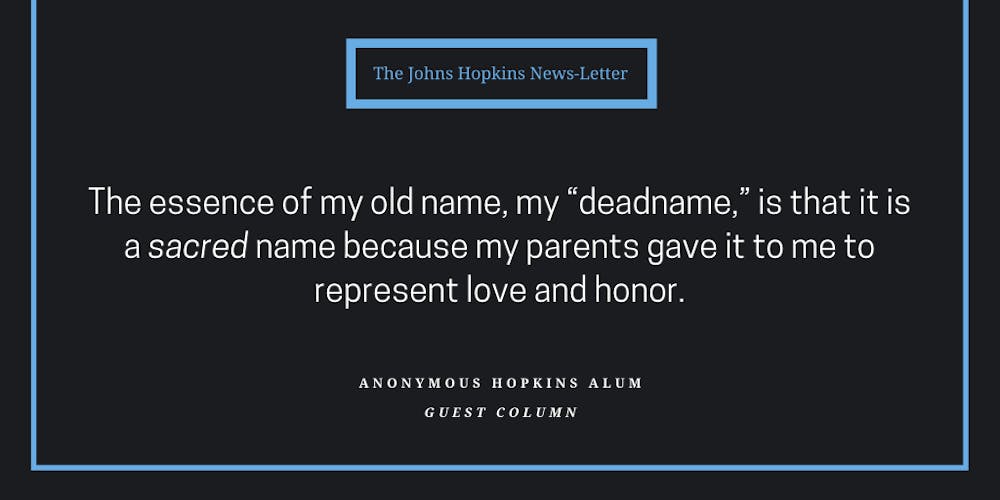A pain surged in my chest when I saw the pictures side-by-side on the wall. Even though I transitioned years ago, I tend to be very protective of that old self because of the backlash that I experienced at Hopkins in going from one state of being to another.
My heart softened as I listened to my dear friend expressing fond memories, remembering me through the lenses of both my names, old and new. My mind drifted to a scene in the film The Danish Girl, when a character tells his transgender friend, “I’ve only liked a handful of people in my life, and you’ve been two of them.”
Later on, I reflected on a different friend’s advice while I thought about my old name. He’d proposed that transgender people stop using the term “deadname” to describe their former names before transitioning. Perhaps if we all embraced our old names, he said, we would “be less sensitive” when others say them.
In honor of the recent Transgender Awareness Week, I hope to share the complexity of what the term “deadname” means to me. There is not a single definition for me. The term is shaped by my inner world and the fulfillment of a cherished dream. The meaning of the term “deadname” is in a state of flux for me, as I sometimes struggle to navigate the turbulent tides of societal attitudes toward transgender people. I battle with how to connect with myself while I continue to factor in how others want me to be and the dangers that come with those perspectives. I am living my dream in the context of a treacherous world. At the cross-section of these realities, I have a “deadname.”
The essence of my old name, my “deadname,” is that it is a sacred name because my parents gave it to me to represent love and honor. These are meanings that I endeavored to retain even as I transitioned and a new name emerged — one that I had secretly called myself my whole life. My new name is inspired by my old one and by heroic characters from my childhood.
I remember sitting in class listening to my elementary school teachers read to us as I dreamed of when I could come out from behind a facade and become the hero of my own life. Even back then, I knew a hidden, coming-of-age story arc that was all my own. My old name is sacred because, for the first 27 years of my life, I hid in my mind — the only place I was free. And then I began the journey to make my dream a reality.
But there was an unexpected plot twist: Becoming the hero of my own narrative meant becoming society’s villain. As society’s villain, transgender people face a battlefield of safety risks. Already the year 2021 has become the deadliest year on record for transgender and gender-nonconforming people succumbing to lethal violence in the United States. On the Transgender Day of Remembrance, commemorated annually on Nov. 20, we mourn these lives tragically lost to unnecessary hatred. It also serves as a solemn reminder for why I am protective of my coming-of-age story and my names.
There are people who may weaponize a transgender person’s sacred name as a way to delegitimize that person. By saying this name purposely in front of others who feel unsettled by trans people, the transgender individual can become a victim of violence. This is due to a dehumanizing notion that exists even within the Hopkins community, postulating that transgender people are “impersonators” and “counterfeits,” which reemerged in a recent article. In fact, until last month, under the gay/trans panic defense, this was still a legal justification for someone to kill a person like me in the state of Maryland and remains a viable defense in the majority of states in our country.
It is distressing to think about all of this. A “deadname” transforms into something shameful and is a reason why transgender people are killed. How do I connect to myself and see all that is sacred within me when I am constantly exposed to dehumanizing rhetoric and safety risks in society?
In times of distress, I search for memories of loving-kindness. I remember a moment of looking at photos side-by-side with a dear friend. He says my names with reverence, not hatred. The shame melts away, and I embrace the sacredness of human dignity.
Anonymous Hopkins Alum graduated in 2017 and is a hopeless romantic about life. The writer was granted anonymity by The News-Letter to protect the writer’s privacy.





